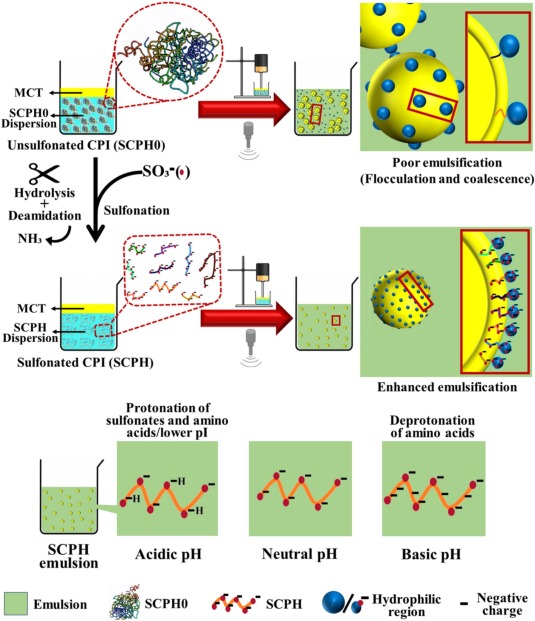- Location : Home» Newsroom
Sulfonated cottonseed hydrolysates with adjustable amphiphilicity as environmental -Stress stable emulsifiers
Cottonseed protein isolate (CPI) is a valuable agro-industrial waste with potential biotechnological applications. However, inadequate stability in water due to its characteristic hinders its widespread use. Therefore, a new sulfonation modification approach was developed to improve the amphiphilicity and structural flexibility of CPI. Structural characterizations confirmed the successful incorporation of sulfonate groups with structural and conformational changes. This significantly unfolded molecular-chain, and improved amphiphilicity, flexibility, and surface-hydrophobicity while reducing pI (5.1-1.7), and molecular-weight (5745-2089 g/mol). The modified samples exhibited improved emulsification with higher amounts of absorbed proteins on the droplet interface, smaller droplet size, and a higher zeta-potential. Additionally, they possessed good emulsification ability under acidic conditions. The nano-emulsions exhibited long-term stability (>= 70 days) under different environmental conditions, with excellent fluidity. This study contributes to understanding sulfonation as a viable approach for improving protein properties, thus, opening up new possibilities for their application and maximizing their economic benefits.
The authors thank the financial support from the Key R&D Program of Xinjiang Uygur Autonomous Region (2022B02039-3), National Key Research and Development Program of China (2022YFD1300600), Agriculture Research System of China (No. CARS-15-26), Central Public-interest Scientific Institution Basal Research Fund (No. Y2022XK21), and State Key Laboratory of Cotton Bio-breeding and Integrated Utilization Open Fund (CB2024A03).
